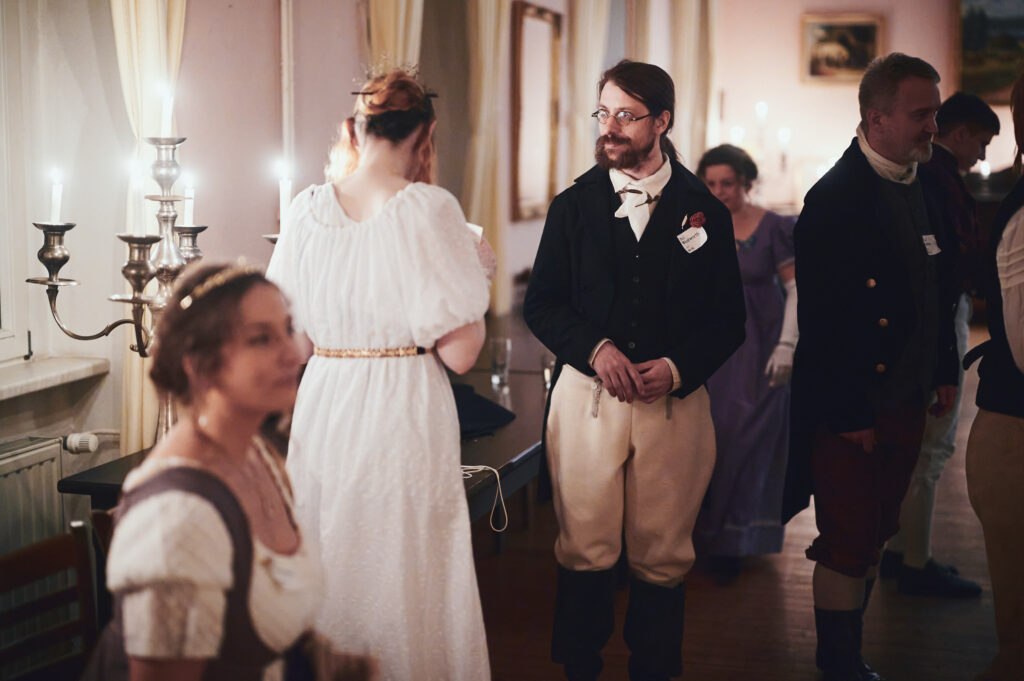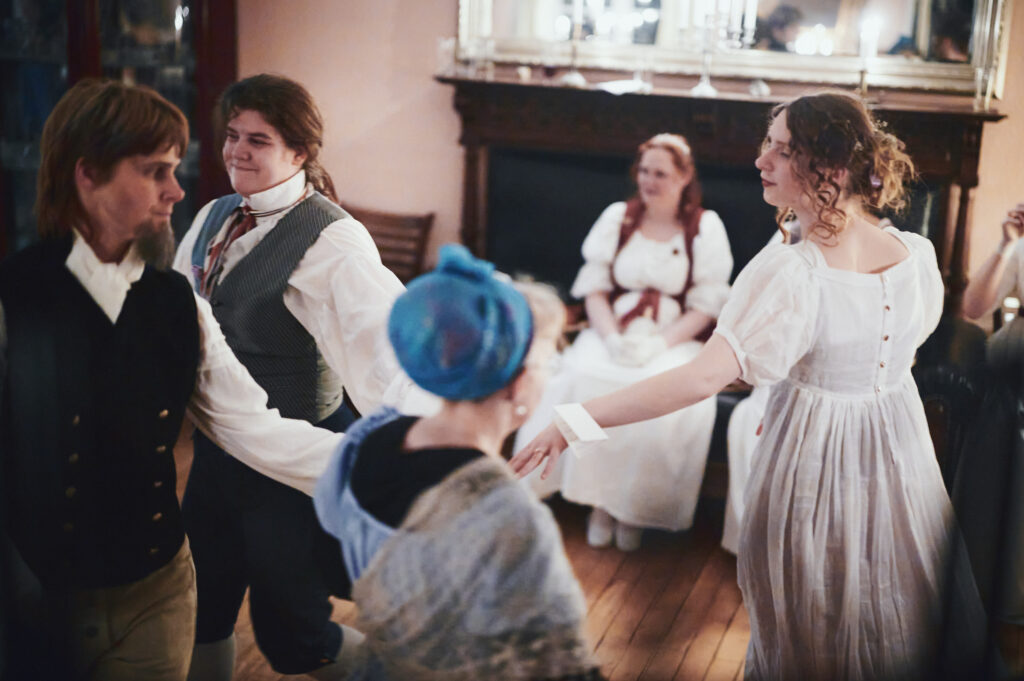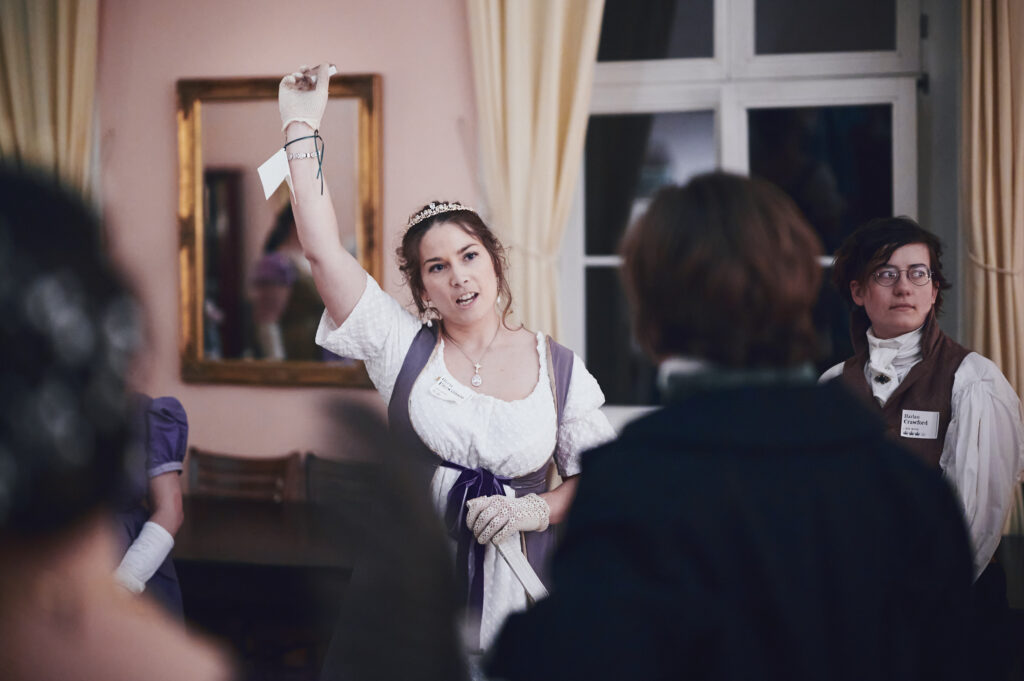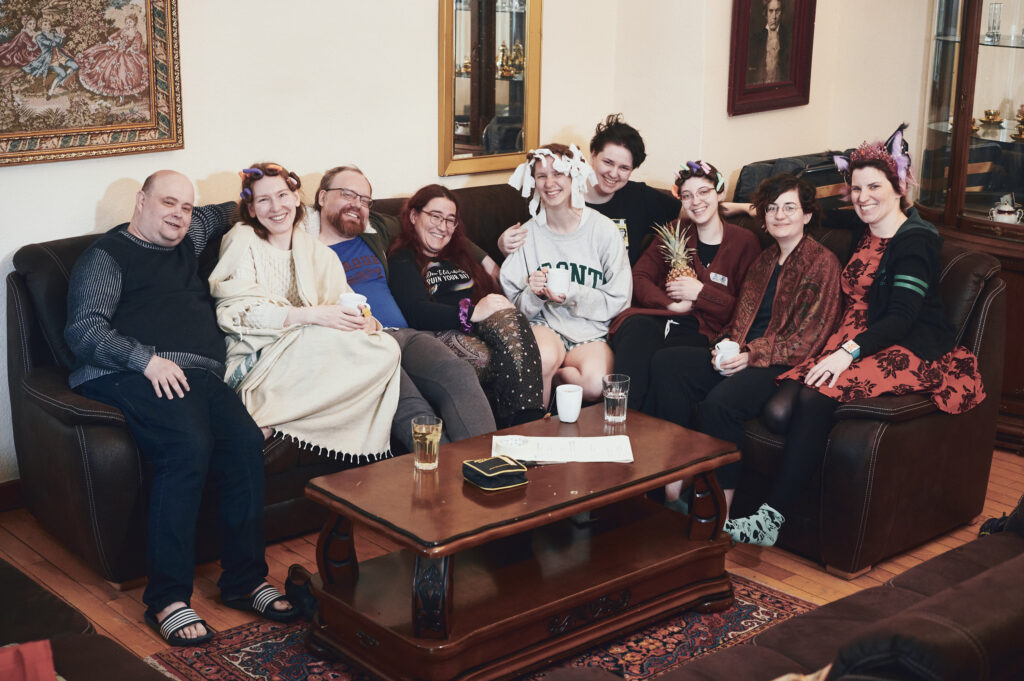 Social Season: The Event from Regency
Social Season: The Event from Regency

At the beginning of May, I took part in the romantic Regency larp Social Season in Germany, set in 1811 England.
The larp takes place in a manor in the north of Germany that has been converted into a recreational facility. The game consists of 26 hours, covering one social season in a rural shire in the east of England. Plots include „who marries whom„, old and recent grievances, secrets and such. About one-quarter of the content is scripted, while the rest was created in workshops and then by player initiative during the game. The game is not transparent by design, and it is up to the players how much of their secrets they tell others when creating content. What is probably the most interesting thing from our Czech point of view is that this larp promotes out-of-game arrangements a lot, i.e. players are encouraged to arrange plots and scenes outside of the game, and in my opinion, it worked quite well. I will describe this in more detail below. And if you wonder whether I liked the larp as a whole, I will tell you this: I have already signed up for the 2024 run.
The Location
The manor is the perfect location for a Regency larp. There are player sleeping rooms upstairs, organizers sleeping rooms on the ground floor and on the same floor, you can also find several lounges equipped with historic furniture and, most importantly, a large hall for communal meals and evening balls. An equipped kitchen is found in the basement. There is a garden around the manor where you can take strolls. The manor is in quite a remote place in the north of Germany, ten kilometres from the nearest train station, but it is really an excellent place for such a larp.
What is Written
There are 30 characters in the game, divided into six families. Each character has set character goals, secrets and memberships in clubs and societies. The character sheet also includes several connections to characters outside of the family. My character description was a little over four pages of text long. So the basis is given, but of course, it is not enough content for the whole game. The content was further expanded in the workshops, and then it was up to the players to create more to have enough play.
Workshops
This brings me to the game’s timeline. The latest possible arrival was on Thursday at four o’clock in the afternoon, but it was possible to arrive early in the evening of the day before. On Wednesday evening, the first dance workshop of progressive longway dances was held, and on Thursday afternoon, there was another one. When all the players arrived, pre-game workshops began. Quite the usual – introductions, going over the game mechanics (forehead touch as a kiss, Ars Amandi for more intimate stuff).
Next on the list was defining safety words, phrases and gestures. What’s interesting is that the equivalent of our „Red stop!„, the word „Cut!„, was actually used in the game in a situation where a player with photosensitivity had problems after a light flashed and had to be escorted out of the room. In a Czech larp, the players would have most likely tried to resolve such a situation in-game and said something like, „She’s feeling unwell; we have to take her away„. The infrequent use of „Red stop!„ in our country is really probably some feature of our larp culture. It is noteworthy that in this case, “Cut!” was also used by another player and not the one with the problem, confirming that it is hard for the affected player to actually use this.
Then a block of workshops in groups followed. The groups were various in-game societies and families. Societies were, for example, a church, a literary club, two rival women’s clubs, etc. Contrary to what I would have expected, these group workshops were not led by the organizers, but we had written instructions on how to do them: Get to know each other, create bonds, group memories, etc. It worked too, but it would have been probably more efficient if they were controlled.

The Game Slowly Starts
On Thursday evening, we played the first two hours of the game, the introductory „Act 0„. Its purpose was to further acquaint players with their families and then with all the other players. Getting acquainted was very important. The organizers did rather an unusual thing of letting the players choose the characters‘ first names. Only initial letters were set, by which the characters were referred to in the game documents (for example, „A. Riveton„). Unfortunately, letters are much harder to remember than names, so it was difficult to remember who is who. The confusion was further enhanced by the predominantly sandbox nature of the game, due to which it was necessary to know well not only the few characters that you played with but also most of the other characters. Plus, I saw the vast majority of the players for the first time, so getting to recognize similar-looking girls, who even sometimes changed their clothes, was quite challenging. The only good thing was that we were wearing name tags for the whole time. They contained the name of the character, age group, social standing and financial situation (yes :) ). For me, it would have been better if the names of the characters were predetermined by the organizers in their entirety.
The funny thing was that the NPCs of maids and footmen also had name tags, and those also included their yearly income. It was a nice subtle hint to the players: „You CAN think of having an affair with that beautiful maid, but look, she is earning just £12 a year while even the poorest girls have £100 per year, and they do not have to work for that. She is really not in your league.„
One More Workshop
On Friday morning, there was yet another dance workshop. Some people therefore went through three dance workshops, the majority went through two, and a few people, who arrived just before the official start, only went through the last one. People could help each other while dancing, so this was an effective way to teach the players the dances quite well without taking up too much of the required workshop time. I, with a few other people, used the time of the last workshop to rehearse in our improvised orchestra – we agreed before the game on Discord that we could play some period-fitting pieces in the game, so we had a harp at our disposal (and two harpists :) ), one flute player and two recorder players. We rehearsed several simple songs that we had selected before the game and then performed them at the game picnic. It added a lot to the atmosphere for me.
We Are Playing
Before Friday noon, the game started. Two acts took place on Friday and two more on Saturday. Including Act 0, it was about 26 hours of play. Within each act, there were preset events (lunch, dinner, picnic, ball, …), and in between them, there were slots in the time schedule that players could reserve for their (society) activities, for example, a croquet tournament. Unfortunately, this system didn’t work very well because sometimes people didn’t have the time to prepare the event, so it slipped to a later time where it started to collide with something else… So the activity times ended up being random anyways.
Otherwise, there were practically no inputs from the organizers within the game. One NPC was present for one act (I heard there should have been one more?), but I didn’t play with them, so I don’t know exactly how much they brought to the game. There was also an in-game newspaper with prepared news from the organizers, but that was more conversation material than anything that advanced the game. A „tabloid„ insert, prepared by the players, was distributed with the newspaper.

How to Calibrate for a Good Game?
I saved the most interesting stuff for the end, and by that, I mean the calibrations, as the organizers called them. There was always an hour or more between the acts, intended just for calibrating between the players. We could discuss what we, as players want from the game and how we would achieve it. Or, if we wanted to make a scene in-game, to ensure other players will react the way the scene needs. Of course, calibration was also possible during the acts; you could just use the calibration gesture and move to the side of the room or to the hallway to talk it through. It would probably be best explained with a real example that occurred before the last act when two boys and two girls, who formed a „love rectangle„ in the previous acts, calibrated:
- Adam: I don’t care which girl I end up with, but I want an ending. If I find out two hours before the end that I won’t get either girl, I won’t have time to start anything new, and the game will end with an empty feeling for me, and I don’t want that.
- Jacques: I want to get engaged to Kitty, and I promised my parents that if it doesn’t work out, I’ll get engaged to Vanessa.
- Vanessa: It doesn’t make sense for me to be with Adam because he can’t travel the world with me.
- Kitty: I can probably end with anyone.
After some discussion, we came to an agreement:
- Jacques gets engaged to Kitty. It won’t work out for them, and they end up breaking up at the ball before the end of the larp.
- Jacques then gets engaged to Vanessa.
- Adam chooses Kitty. At first he will be sad that she got engaged to someone else, then when her engagement to Jacques is called off, he will finally get engaged to Kitty.
We played according to the plan. I played Adam, and even though I knew it was arranged, it was still quite emotional to see my „love„ with someone else. It even led to a scene of an abrupt departure from the dinner table. This may not seem like much, but in the context of the larp, it was a gross violation of social protocol that didn’t go unnoticed.
At the last ball, the engagement of Kitty and Jacques was cancelled as planned, and Adam and Kitty finally started to get closer. However, as we played it, it seemed to me that getting engaged right after the previous engagement was cancelled is just too soon. So I gestured to Kitty’s player, we walked away, agreed that she feels the same and changed the plan: We would dance together three dances in a row, which in the game world was a sign that the two were serious with each other and an engagement is on the way. However, it didn’t actually go like that in the end because other plot lines started their finish, which ended the ball prematurely, and then the game was over. But it was still a satisfying ending for me.
Would Calibration be Possible in Czech Larps?
As you can see, even if the game is played according to an agreed-upon scenario, it does not mean that the game cannot induce the player’s emotions. And that it almost never goes according to plan, so you don’t know exactly how it will turn out anyway. However, it’s a good way to achieve player satisfaction and not have your game ruined by a dumb accident or something like that just didn’t work out.
Yes, this element does appear in some Czech larps. Sometimes only occasionally, when the players agree on the outcome of a game duel in advance and then play it. Some games build on this more, such as Cien Años de Soledad or Fallen. Unfortunately, I haven’t played those, so I can only compare them indirectly. But according to the information I have, these games are quite scripted. In them, calibration is used more to determine the path to reach a predetermined goal rather than to allow the players to design their experience freely. And even the time gap of six years between Cien Años and Fallen shows that this element is rather exceptional in Czech larps.
Personally, I would like to see more Czech larps that use calibration. It’s just not so easy because players have to learn how to play in this system. I actually quite botched the first larp I played that used calibration (Brudpris). But while doing so, I observed other players and learned what possibilities this system gives and how they can/should be used. At Social Season, I used that experience in calibration, so it went pretty well. If there are a few inexperienced players, it doesn’t matter so much, but on a Czech larp relying on calibration, there would be a majority of inexperienced players. So I’m afraid that organizing a „less scripted„ larp, where the calibration is an essential element, would at least require a lot of attention in the workshops.

Thanks
I would like to thank the organizers for running the larp and taking care of us. I also thank my co-players for the story we created together. And I especially thank the German-speaking players and organizers for the fact that, although they made up more than half of the attendees, they rarely slipped into German even outside of the game, so for people who didn’t speak German, it was still possible to participate in almost any conversation.
Special thanks go to Iva Vávrová for proofreading and language corrections.
Social Season
Place: Gutshaus Gross Markow
Number of players: 30
Creator: Dombrowski Event UG